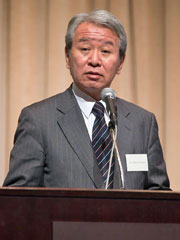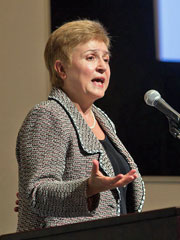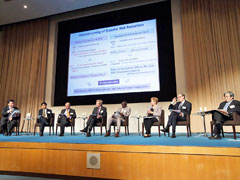On November 11, as many as 200 people from embassies, development partners, academia and NGOs gathered at the United Nations University in Tokyo, to listen to the discussions on how development actors can accelerate the efforts to build resilient societies against natural disasters. The conference, “Development Assistance toward a Safe and Secure Future – Building Resilient Societies against Natural Disasters”, was held just before the Japan-EU summit, which will be taken place on November 19, with attendance of Kristalina Georgieva, the EU Commissioner for International Cooperation, Humanitarian Aid and Crisis Response, who has shown her strong commitment on reconstruction from the East Japan Great Earthquake in 2011.

President Tanaka, giving a speech
In his opening remark, Akihiko Tanaka, the President of JICA, started by expressing his condolences for the people in the Philippines lost their lives after Typhoon Haiyan and emphasized that “it is necessary to improve people’s capacity against natural disasters that may destroy people’s safety in the blink of an eye, and to build resilient societies; such is of critical importance for realizing human security.” He also called on the international community to “guarantee sustainable development by putting disaster risk reduction as an important pillar of the Post-2015 Development Agenda.”

Kristalina Georgieva, the EU Commissioner for International Cooperation makes a speech
Georgieva followed by pointing out that “recurrent disasters and shocks are hitting the most vulnerable country and the people, and has been the inequality creating factor. Long term commitment of the international community to address root cause of resilience, investment in preparedness and multi-sectoral and multi-hazard holistic approach are needed to build a resilient society.” and emphasized “how critical it is to build a common approach between humanitarian and development community in this transformation to a resilient world.”
The panel discussion was joined by following panelists.
-Takehiro Kagawa, Director-General for Global Issues of the Japanese Ministry of Foreign Affairs
-Christian Masset, Ambassador of French Embassy in Japan
-Suporn Ratananakin, Senior Specialist on Disaster Management of Thai Ministry of Interior
-Patricio Torres, Ambassador of Chilean Embassy in Japan
-Michael Lindenbauer, UNHCR Representative in Japan
-François Oubida, Ambassador of Burkina Faso Embassy in Japan
-Hiroshi Kato, Vice President of JICA (Moderator)
The panelists shared the cases from Africa, Asia and Latin America, on country’s challenges, efforts and lessons learnt as well as policies and measures to cope with natural disasters and risks. They also pointed out the importance of encouraging development and poverty eradication that takes into account strengthening resilience of societies.
As a result of the discussion, the moderator summarized the discussion into following three points; 1) mainstreaming disaster risk reduction/management (DRR, DRM) and building resilient societies in the national development plan, 2) promote DRR/DRM and set a clear linkage to international dialogues such as climate change, Post-2015 Development Agenda and Post Hyogo Framework, and 3) strengthen capacities to close gaps at all levels (humanitarian assistance & development assistance, urban and rural, government and people, etc.). The outcome of the discussion will be documented and posted on website of JICA, EU and UNHCR. The results of the seminar are also expected to provide valuable inputs into the discussion on the Post-2015 Development Agenda and the Post Hyogo Framework for Action.
In the meeting between President Tanaka and Commissioner Georgieva that took place just before the seminar, both agreed to continue provide inputs and contribute to place disaster management as one of pillars in the Post-2015 Development Agenda. They also welcomed the recent JICA-EU collaboration in Kenya, focusing on community-based measures to cope with famine, and shared current issues in Somalia and Mali where vulnerabilities and shocks such as natural disasters, conflict and political unrest calls for holistic actions.

Panel discussion(*)
JICA places importance in partnering with other development partners with a view to conduct effective and efficient cooperation. EU is one of such influential partners that contribute to international development dialogue and deliver effective results. Last year, JICA newly dispatched a staff to Brussels to enhance strategic partnership with the EU headquarters. Since then, JICA and EU held high level dialogues in Tokyo and Brussels to find common interests and promote collaboration. At the occasion of TICAD V in June at Yokohama, President Tanaka met with EU Commissioner Andris Piebalgs in charge of Development Cooperation and agreed to enhance partnership in Africa. Soon after TICAD V, JICA held a seminar in Brussels and shared Japan’s policy on support to Africa with EU officials to promote complementary cooperation in Africa.
(*) photo: from left to right
-Takehiro Kagawa, Director-General for Global Issues of the Japanese Ministry of Foreign Affairs
-Suporn Ratananakin, Senior Specialist on Disaster Management of Thai Ministry of Interior
-Patricio Torres, Ambassador of Chilean Embassy in Japan
-Michael Lindenbauer, UNHCR Representative in Japan
-François Oubida, Ambassador of Burkina Faso Embassy in Japan
-Kristalina Georgieva, the EU Commissioner for International Cooperation, Humanitarian Aid and Crisis Response
-Christian Masset, Ambassador of French Embassy in Japan
-Hiroshi Kato, Vice President of JICA (Moderator)
- Africa's economic transformation: The role of natural resources(Friends of Europe)
- 21st Japan-EU Summit Joint Press Statement(Reference to JICA in Paragraph 9)




scroll